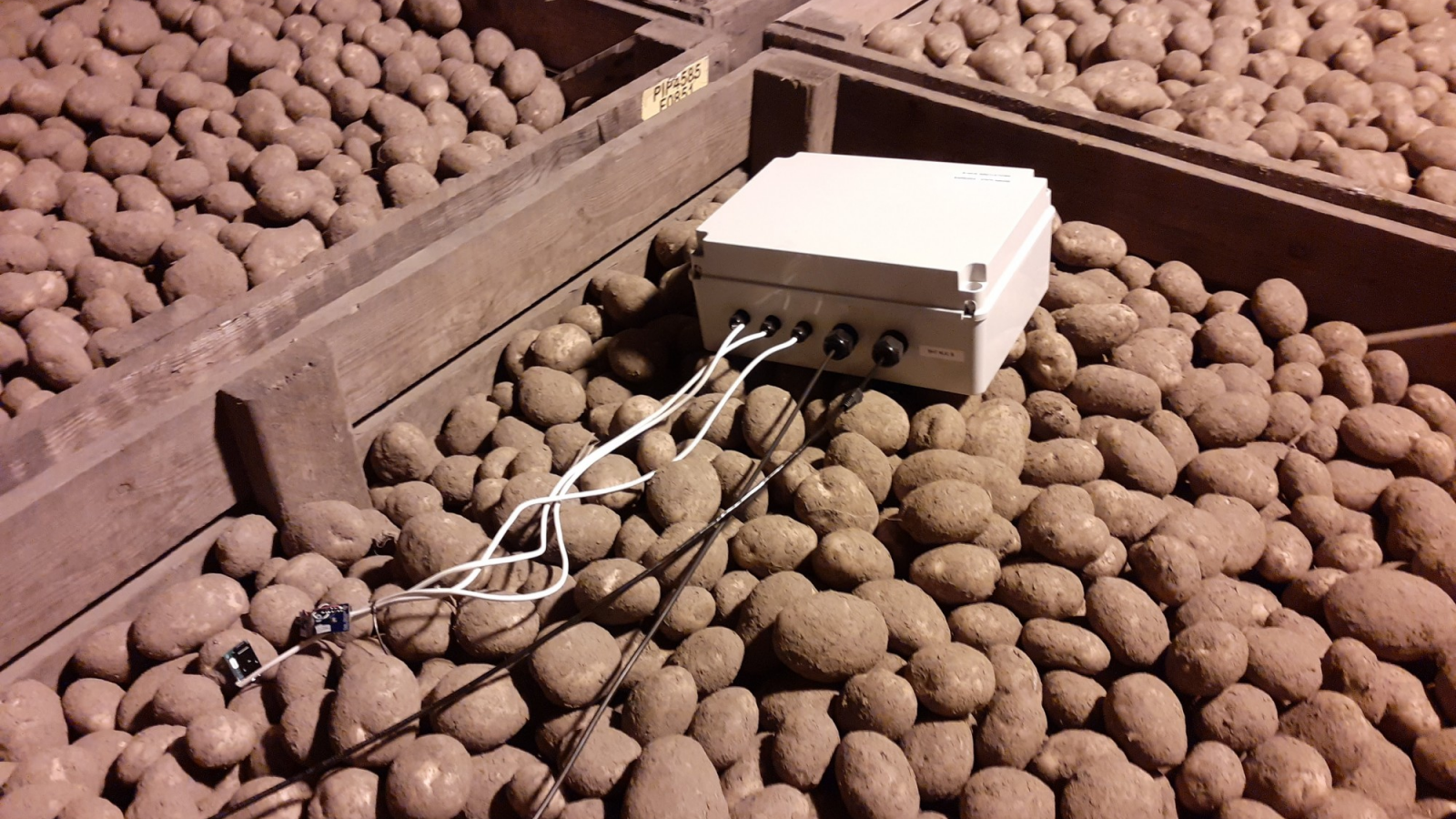
Case Study on the Knowledge Transfer Partnership (KTP) between:
- B-hive Innovations Ltd
- University of the West of England
- KTP Associate Dr Barbara Correia
- KT Adviser from KTN: Philippa Ryan
This project was co-funded by Innovate UK and BBSRC.
About B-hive Innovations
B-hive Innovations Ltd is an agritech business that conducts R&D activities for the fresh produce industry, aiming to increase quality and reduce food waste.
What was the challenge that the KTP was set up to address?
Under certain growing, storage and handling conditions, potatoes can develop internal defects that affect their quality. This leads to significant reductions in crop value throughout the supply chain, increases food waste and reduces consumer confidence in the product.
This project aimed to develop a new gas sensing technology to non-destructively detect internal defects in potatoes before reaching the consumer, thereby increasing the quality of fresh produce and reducing food waste.
Why was KTP the right mechanism to achieve this?
This project required skills in both scientific experimental design and volatile compound identification/analysis, which B-hive did not have in-house.
- UWE Bristol provided the broad-ranging expertise in gas sensing and advanced mass spectrometry instrumentation needed to carry out the research.
- Together with the KTP Associate (and Agri-Tech Development Scientist), the team was then able to translate the complex scientific knowledge into a sensor technology prototype that has been tested and refined into a suitable industrial solution.
This partnership enabled the development and testing of a sensor technology prototype in the industrial environment (utilising B-hive Innovations expertise and facilities) with the potential to monitor and detect the early presence of internal defects in real-time.
What changed as a result of the KTP?
B-hive, UWE Bristol and the KTP Associate have built a sensing technology platform with the capability to detect internal defects in potatoes that could be exploitable across the agri-tech sector.
This has also resulted in a knowledge base of (1) volatile compound profiles related to potatoes that develop internal defects, (2) new expertise in experimental design and data analysis applied to potato tubers, and (3) long-term industrial deployment of robust sensor technology.
This knowledge exchange has paved the way to seeking additional funding to progress the next R&D activities and shorten the gap towards commercialisation. The partnership has also unveiled new potential agri-tech applications for this type of sensing approach.
Broad benefits and impacts for all partners
For B-hive Innovations:
- Gained new skills in-house regarding gas sensor prototype development, testing and deployment within the agri-food sector.
- Outcomes have opened up new possibilities for B-hive to commercialise the developed innovation and know best practice for success.
For UWE Bristol:
- Further experience of agri-food manufacturing processes and sensor hardware/software integration for industrial implementation. This has created new knowledge on which the team can focus future endeavours and strengthen its position as a facilitator of industrial development.
For the KTP Associate:
- The KTP Associate has gained new scientific and transferable competencies, gathered a considerable understanding of the potato industry and its needs, and gained experience in a business environment.
- The KTP Associate has been employed by the company to take the project’s innovation forward.
Quantifiable benefits
When identified as defective and failing quality control inspections, a tonne of potatoes reduces its value on average from £185 to £12. This represents a loss of value of 93.5%. Considering a cold store comprises between 500 and 1200 tonnes, early detecting a defective stock and trading it before it loses its commercial value could represent earnings in between £86,500 and £207,600 – for just one storage unit!
What do the partners say about the KTP?
Dr Robin Thorn, Associate Professor in Molecular Life Sciences, Centre for Research in Biosciences, UWE Bristol. “It has been fantastic having the KTP Associate embedded within the company, ensuring the project remained industrially focussed, and resulting in collective tangible outcomes that have benefited the Company, the Associate and the University.”
Vee Gururajan, Managing Director, B-hive Innovations. “Having the opportunity to draw on dedicated resources and expertise of both the KTP Associate and the team from UWE Bristol has been invaluable and has helped us to make good progress. The results so far have been very encouraging, and we look forward to refining the achieved outcomes beyond the project timescale with a view to commercialising this innovation.”
Dr Barbara Correia, KTP Associate, UWE Bristol/B-hive Innovations. “I was immediately attracted to this project for its challenging, innovative and applied nature, but I must say it was when I met the team that I was sure this was going to be a great experience. The constant support, communication and knowledge exchange have proved crucial to the successful progress of this project – and I have learnt so much along the way.”
Every KTP enjoys the support and expert input of one of KTN‘s specialist Knowledge Transfer Advisers, based throughout the UK. They are there to guide every project throughout all stages and help ensure its success. Here, that was Philippa Ryan who added:
“This partnership has been impressive throughout, with real commitment from the company, the academic team and the Associate to ensure its success. They have worked hard to overcome the challenges of remote working and limited access to lab facilities and potato storage sites, with the positive outcomes for all showing how well they came together as a team. With plans to continue their collaboration, this is an excellent example of how the KTP Programme delivers positive change to all”.
A requirement of every KTP is that all three partners should benefit from the collaboration. And this is one of the secrets of its success: the KTP Programme has been helping businesses, such as B-hive Innovations, to deliver innovation advantage for more than 45 years.
If you think a collaboration with a specialist academic team could help drive success in your business, locate your nearest Knowledge Transfer Adviser and get in touch about KTP today.
Funding competitions for KTP are open throughout the year. Find out more here.





